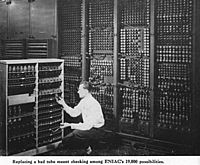
Photo from wikipedia
BACKGROUND The primary aim of this study was to examine the efficacy of two motivational interviewing-based alcohol brief interventions (BIs) among adults presenting to an emergency department (ED). The secondary… Click to show full abstract
BACKGROUND The primary aim of this study was to examine the efficacy of two motivational interviewing-based alcohol brief interventions (BIs) among adults presenting to an emergency department (ED). The secondary aim was to evaluate moderators of intervention effects. METHODS Participants were 750 ED patients reporting recent alcohol misuse. Participants were randomly assigned to: 1) computer-delivered BI (Computer BI), 2) therapist-delivered BI with computer guidance (Therapist BI-CG), or 3) control. The BIs focused on reduction of alcohol use and risk behaviors. The outcome measure was trajectories of alcohol consumption (measured by the AUDIT-C) across baseline, 3-, 6- and 12-month follow-up assessments, analyzed using latent growth curve modeling. Moderation of intervention effect by gender, age, and baseline alcohol use disorder severity was examined. RESULTS Across the full sample (40% males, mean age = 35.8, SD = 12.3), there was an overall reduction in alcohol consumption across 12 months. The main effects of the Therapist and Computer BI were not significant relative to control. Moderation analysis revealed that the impact of Therapist BI-CG, relative to control, was greater on reductions in alcohol consumption in participants with moderate to severe symptoms of alcohol use disorder compared to those with mild symptoms. The effect of the Computer BI on alcohol use, relative to control, was greater among younger participants compared to older participants. CONCLUSIONS While no overall effect was shown, ED-based Therapist BI-CG with computer guidance may be effective among patients with moderate-severe drinking patterns, whereas Computer BIs may be more effective for younger participants.
Journal Title: Drug and alcohol dependence
Year Published: 2019
Link to full text (if available)
Share on Social Media: Sign Up to like & get
recommendations!